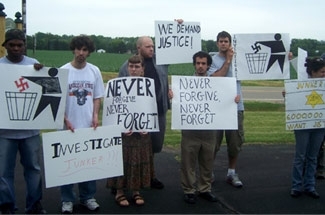MILWAUKEE, June 21 (JTA) — It didn’t take long for news to travel as far as Israel that in Wisconsin’s Walworth County, a German immigrant farmer had constructed on his land a little building as a shrine to German Nazi dictator Adolf Hitler. The Week, a newspaper in the county, published on June 9 a story about Ted Junker of Millard, a town northwest of Elkhorn. Junker, 87, said that he had volunteered for the Waffen SS during World War II and fought on the Russian front. According to other news reports, his residence in the U.S. is legal because he did not serve in a concentration camp. He told The Week that he wanted in his shrine to tell “both sides” of the story of the man who “was the greatest leader ever.” Junker further told the paper that “Not one person was gassed to death in the Third Reich,” that Hitler “respected other races” and that only when the “World Jewish Organization” declared war on Germany after Hitler became chancellor in 1933 did Germans begin to have suspicions about Jews. Junker, who had lived in the county since 1963, further said that he wanted to hold a public opening of the shrine on Sunday. By June 11, the national office of the Anti-Defamation League had received the article, and on Monday it forwarded it to ADL’s upper midwest regional office, based in Chicago, said Adam Schupack, associate director of that office. The next evening, a news report aired on Milwaukee television Channel 6, which is how Kathy Heilbronner, assistant director of the Milwaukee Jewish Council for Community Relations, learned of the issue. The following day, she began receiving calls about it from people in the Milwaukee Jewish community, including a Holocaust survivor, and from the Milwaukee Journal Sentinel, she said. Then on June 14, an article about Junker and his plans appeared in the Journal Sentinel, which is how Harriet Schachter McKinney, executive director of the American Jewish Committee’s Milwaukee chapter, learned of the matter. It was that day when Jonathan Brostoff, president of the Campus Organization for Israel at the University of Wisconsin, Milwaukee, heard about it. Also that day, news wire services began to pick up the story, and it appeared not only throughout the United States, but also in the Israeli daily Ha’aretz. Heilbronner said she began receiving communications about the story from New York City, N.Y. and Boston. Naturally, all these Jewish community members found the news upsetting. The question was what to do about it. It was clear to the Jewish community professionals that, as Schupack told The Chronicle in a telephone interview Tuesday, there is “a fine line in such situations” between working to counter such incidents and giving them greater publicity. It soon became clear to all of them that the local government and law enforcement officials in Junker’s area as well as the local office of the Federal Bureau of Investigation were well aware of Junker and his plans. Heilbronner and McKinney had a conference telephone call with local FBI agents about the matter. Moreover, the Journal Sentinel reported last Friday that Junker had met with Walworth County Deputy Corporation Counsel Michael Cotter and county Sheriff David Graves on June 15 — with the result that Junker canceled the Sunday public opening of his shrine. The Journal Sentinel also reported that Graves promised that the sheriff’s department would be on alert on Sunday. “I was heartened by the fact that folks in Walworth County have a good process and were clearly on top of this,” McKinney said. “My sense is that it is being handled.” Heilbronner said it was also clear from what she learned from the Walworth County law enforcement officials that Junker was “not a typical hate monger.” “This man is not affiliated with neo-Nazi or white supremacist groups,” she said. “He is not calling people to arms or calling for the extermination of the Jews. He is apparently mild-mannered” and by himself is “not a threat,” and therefore, “we did not feel a rally or protest was appropriate.” However, such a response was not enough for Brostoff and others he knew. “This is not something I feel we can be silent about,” he told The Chronicle in a telephone interview Monday. According to a release Brostoff e-mailed to The Chronicle, he and “some three dozen” people mounted on Sunday a protest demonstration in the town of Sugar Creek near Elkhorn. The action was organized by Brostoff and Eli Federman, president of L’Haim Foundation, a charitable foundation devoted to the education and betterment of students at UWM. The demonstrators denounced Junker and called for him to be investigated by the U.S. Justice Department’s Office of Special Investigations, the agency charged with investigating, prosecuting and deporting Nazi war criminals who entered the U.S. illegally. Moreover, Schupack is concerned that even with Junker’s decision not to have a public opening of his shrine, which Schupack called “an important step,” that fact “in no way means that the situation has been resolved.” Junker’s structure could become “a place of pilgrimage” to members of neo-Nazi and white supremacist groups, Schupack said. He added that his office has been monitoring Web sites and Internet chat rooms of such organizations, which are discussing the shrine. At least one such group, the Minneapolis-based National Socialist Movement, has announced that it plans to mount some kind of event at the site in the next few weeks.
JTA has documented Jewish history in real-time for over a century. Keep our journalism strong by joining us in supporting independent, award-winning reporting.






